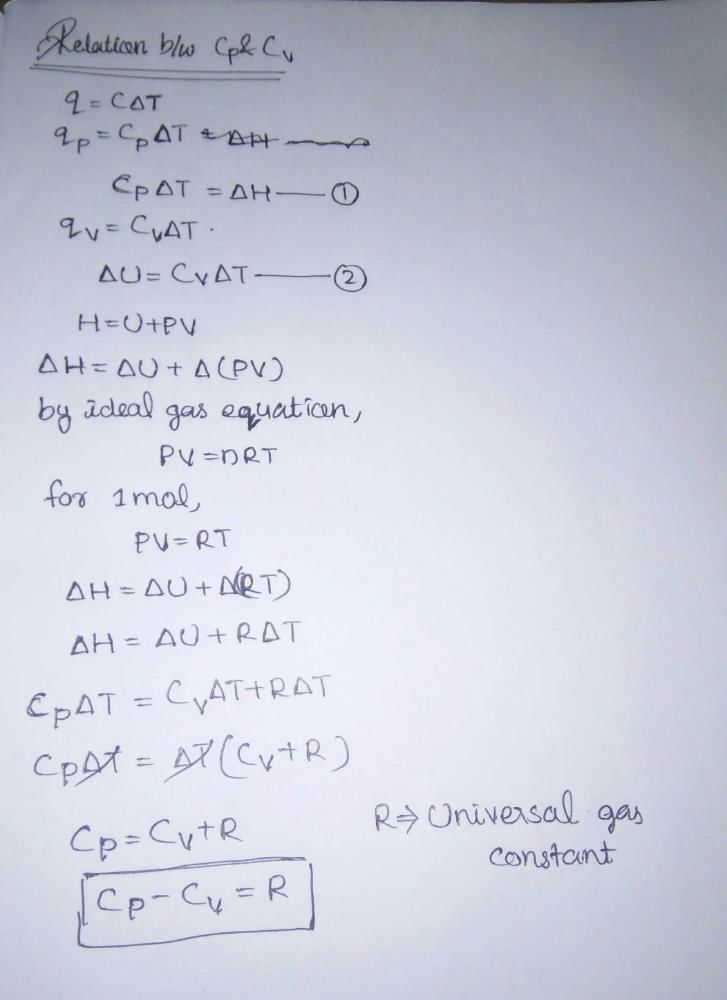Class 11 Exam > Class 11 Questions > Relation between cp and cv?
Start Learning for Free
Relation between cp and cv?
Community Answer
Relation between cp and cv?
Relation between cp and cv
Cp
Cv
Relation between Cp and Cv
Specific heat is defined as the amount of heat required to raise the temperature of a unit mass of a substance by one degree Celsius. There are two types of specific heat: Cp and Cv.
Cp
Cp is the specific heat at constant pressure. It is defined as the heat required to raise the temperature of a substance by one degree Celsius at constant pressure. Cp is always greater than Cv.
Cv
Cv is the specific heat at constant volume. It is defined as the heat required to raise the temperature of a substance by one degree Celsius at constant volume. Cv is always less than Cp.
Relation between Cp and Cv
The relationship between Cp and Cv can be expressed as:
Cp - Cv = R
where R is the gas constant for a particular gas. This relationship is known as Mayer's formula.
For an ideal gas, the value of R is constant, and hence the difference between Cp and Cv is also constant. The value of R depends on the molar mass of the gas and the universal gas constant.
The value of Cp is always greater than Cv because, during the heating process, some heat energy is used to do work in expanding the gas. This work done is not present in the case of constant volume heating, and hence Cv is always less than Cp.
The relationship between Cp and Cv is essential in thermodynamics as it helps in calculating the change in internal energy and enthalpy of a system.

|
Explore Courses for Class 11 exam
|

|
Relation between cp and cv?
Question Description
Relation between cp and cv? for Class 11 2025 is part of Class 11 preparation. The Question and answers have been prepared according to the Class 11 exam syllabus. Information about Relation between cp and cv? covers all topics & solutions for Class 11 2025 Exam. Find important definitions, questions, meanings, examples, exercises and tests below for Relation between cp and cv?.
Relation between cp and cv? for Class 11 2025 is part of Class 11 preparation. The Question and answers have been prepared according to the Class 11 exam syllabus. Information about Relation between cp and cv? covers all topics & solutions for Class 11 2025 Exam. Find important definitions, questions, meanings, examples, exercises and tests below for Relation between cp and cv?.
Solutions for Relation between cp and cv? in English & in Hindi are available as part of our courses for Class 11.
Download more important topics, notes, lectures and mock test series for Class 11 Exam by signing up for free.
Here you can find the meaning of Relation between cp and cv? defined & explained in the simplest way possible. Besides giving the explanation of
Relation between cp and cv?, a detailed solution for Relation between cp and cv? has been provided alongside types of Relation between cp and cv? theory, EduRev gives you an
ample number of questions to practice Relation between cp and cv? tests, examples and also practice Class 11 tests.

|
Explore Courses for Class 11 exam
|

|
Signup to solve all Doubts
Signup to see your scores go up within 7 days! Learn & Practice with 1000+ FREE Notes, Videos & Tests.




























